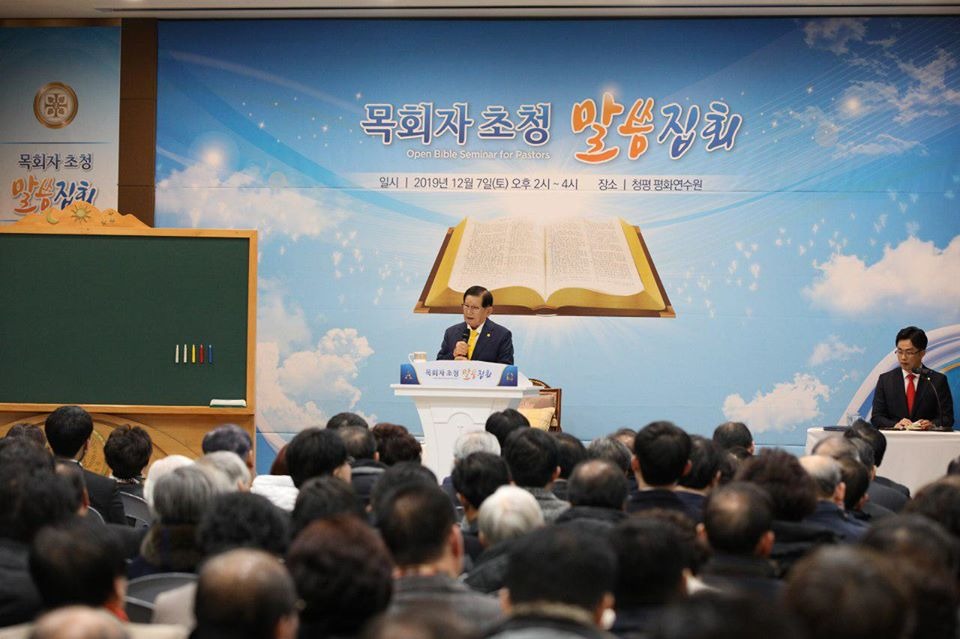The Singapore chapter of the Shincheonji religious sect has made headlines for the second time this year, with 21 people arrested for allegedly being members of an unlawful society.
Earlier in February, investigations were launched into the local chapter of the Shincheonji Church of Jesus the Temple of the Tabernacle of the Testimony (SCJ).
As a result, five South Korean nationals who held key positions were repatriated, while the group’s front entities were dissolved.
“Members of the local chapter were issued warnings to cease further involvement in SCJ activities or face further action from the authorities,” CNA reported yesterday.
However, the Ministry of Home Affairs (MHA) recently found that the Singapore chapter had resumed activities covertly under the direction of its parent chapter.
Accused of being a cult, we trace the development of Shincheonji and take a look at some of their practices. Here are 5 things you need to know.
1. UNORTHODOX TEACHINGS
Founded in 1984 by South Korean national Lee Man-Hee, Shincheonji, which in Korean means “new heaven and earth”, has over 200,000 followers in South Korea and overseas.
Born in Chungdo, South Gyeongsang Province, 88-year-old Lee first joined a religious group in 1957, thinking it would help him cure his leprosy.
A decade later, Lee became a believer of a religion called Temple of Tabernacle of Yoo-Jae-yeol. However, its leader was arrested in 1975 for fraud.
Later on, Lee joined the Solomon Creation (Changjo) Church, which claimed the end of the world would come in March 1987.
Lee himself claims that he is the second coming of Jesus Christ, and that he will bring 144,000 followers to Heaven with him on Judgement Day.

2. EMBROILED IN COVID-19 SCANDAL
In February, over half a million South Koreans had signed an online petition, calling for the forcible dissolution of SCJ, blaming the group for the nation’s sudden spike of COVID-19 cases.
At that time, over half of South Korea’s more than 2,300 COVID-19 cases were linked to SCJ.
Lee was also accused of hiding information about his members from contact tracers and was arrested in August on charges of obstructing the Korean government’s efforts to contain the pandemic.
3. USE OF DECEPTION
SCJ teaches that deceit and lies are acceptable so long as it serves God’s purposes. It has also been accused of sending members to “infiltrate” other churches to lure them to SCJ.
MHA found that the Singapore chapter of SCJ, which it believes has fewer than 100 members, was using front companies to recruit Christian youths and young adults.
The local chapter of SCJ had initially attempted to register a company in Singapore under the name “Heavenly Culture, World Peace and Restoration of Light” in February 2019.
Investigations later found that SCJ had also previously incorporated another front company in 2016, known as Spasie, which describes itself as offering consultancy services and the development of software.
It also set up a proprietorship in 2019 called Kings Ave, which claimed to provide corporate training services, motivational courses and personal development workshops, but was instead used to lease a property that became a “temple”.
4. CONTROLLING INFLUENCE
MHA investigations showed that the Singapore chapter had not only used deceptive recruitment methods on Christian youths and young adults, but also required them to comply with strict instructions to conceal the existence of SCJ and their involvement with it.
Secretive and isolated, SCJ members were not allowed to contact other members, verify teachings with other churches, or disclose the activities of SCJ to their families and friends.
According to a first-hand account by a 23-year-old woman who was involved in the local chapter, there were restrictions such as not being able to ask other students how they ended up in the group, not being allowed to exchange contact numbers and not sharing what they had learnt with others outside of the community.
She was also questioned on her beliefs, causing her to doubt how well she knew the Bible.
Lee claims to be the only one who is allowed to interpret the Bible, denouncing other churches and pastors by saying they belong to Satan and that SCJ’s teachings are superior.
In Korea, it is said that only those who have completed a six-month education on the sect and formally enrolled as members are qualified to attend their services.
There have also been reports of recruitment competitions among members, where fines are imposed onto members who fail to hit their quota.
5. LURE OF COMMUNITY
Despite the doubts she had, the 23-year-old who joined the local chapter of SCJ said she felt like she was in a safe community and homely environment as the people she met “were very genuine and empathetic”, with members even enjoying home-cooked meals together.
She also felt comfortable sharing her struggles with her Bible study leader, who appeared to be “very articulate” and “passionate about teaching the Word”.
However, having read other accounts by former SCJ members, she now suspects that some members of the group may have been “planted” to create a positive impression.
Having left after eight sessions, she now advocates the importance of knowing the Bible well and advises others to do background checks on the leaders and religious organisations they follow.
“A servant of God won’t ask you to hide anything about God from anyone,” she told Salt&Light.








